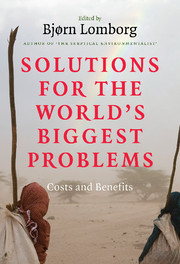Book contents
- Frontmatter
- Contents
- List of figures
- List of tables
- List of contributors
- Acknowledgements
- Introduction
- Part I Economy
- Part II Environment
- Part III Governance
- 11 Arms proliferation
- 12 Conflicts
- 13 Corruption
- 14 Lack of education
- 15 Terrorism
- Part IV Health and population
- Conclusion: Making your own prioritization
12 - Conflicts
Published online by Cambridge University Press: 08 July 2009
- Frontmatter
- Contents
- List of figures
- List of tables
- List of contributors
- Acknowledgements
- Introduction
- Part I Economy
- Part II Environment
- Part III Governance
- 11 Arms proliferation
- 12 Conflicts
- 13 Corruption
- 14 Lack of education
- 15 Terrorism
- Part IV Health and population
- Conclusion: Making your own prioritization
Summary
Introduction
The high profile of the security challenges facing rich countries has tended to crowd out the rather different security challenges facing poor countries. A discourse on international security that does not address these challenges is one-sided and less likely to gain acceptance.
The key security challenges facing poor countries are civil wars and coups. Currently, governments respond to these risks by military spending. Both the risks and the response are highly costly. If there were cost-effective international interventions that would substantially reduce the risks of wars and coups and reduce military spending, the payoff to poor countries would be enormous. Yet even among the international interventions designed to help such countries, security has received less policy attention than ‘photogenic’ topics like health and education. International security interventions, though numerous and expensive, have not been guided by cost–benefit analysis. With the establishment of a permanent UN Peacebuilding Commission in September 2005, there is a real opportunity for more informed and coherent international action. There is the potential to build on recent advances in the quantitative study of security issues in poor countries as exemplified by the contributions to the new Handbook of Defense Economics (Hartley and Sandler, 2007).
This chapter will first estimate the costs of these phenomena in poor countries and then investigate four possible ways of ameliorating them: increasing aid; making aid conditional upon limits to military spending; expanding peacekeeping forces and guaranteeing security using ‘over-the-horizon’ measures.
- Type
- Chapter
- Information
- Solutions for the World's Biggest ProblemsCosts and Benefits, pp. 220 - 228Publisher: Cambridge University PressPrint publication year: 2007



